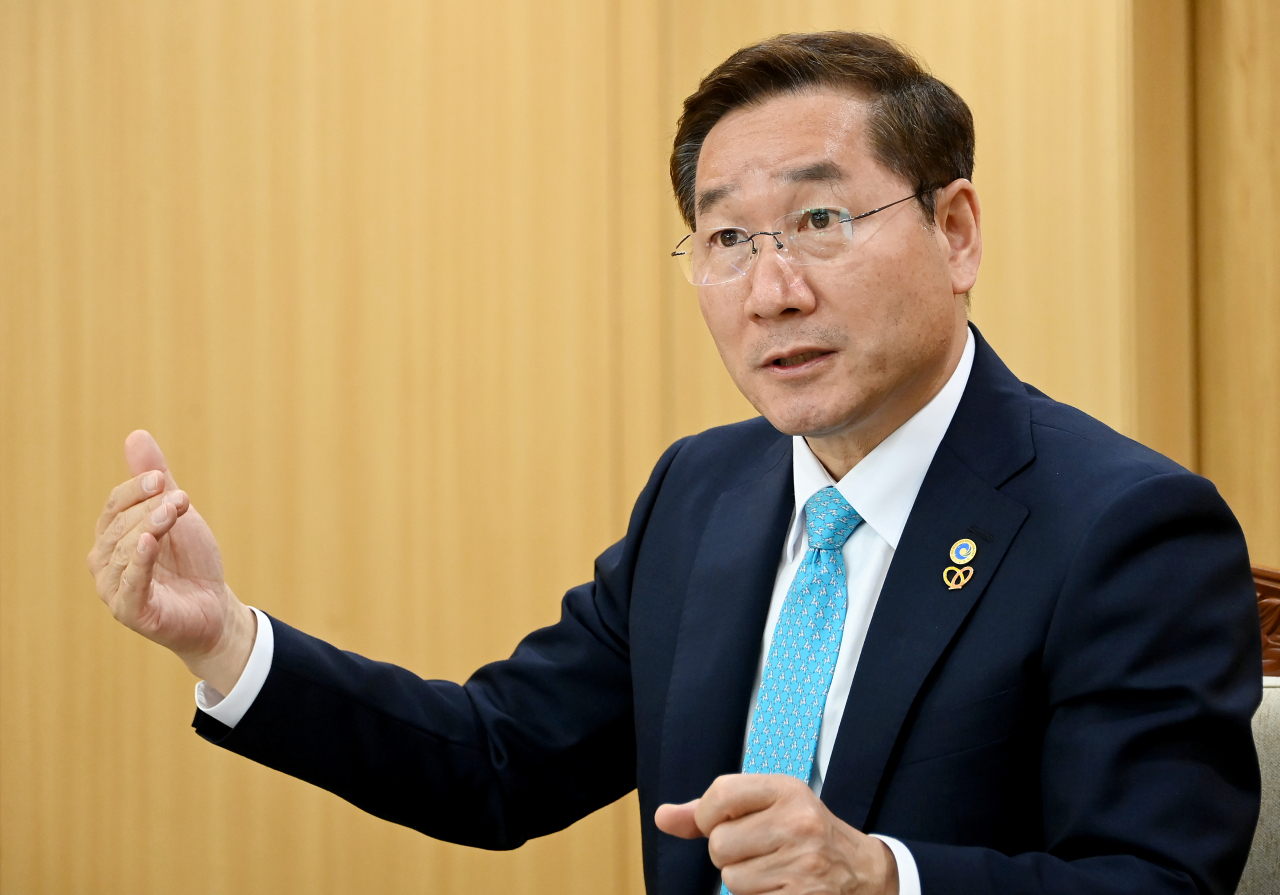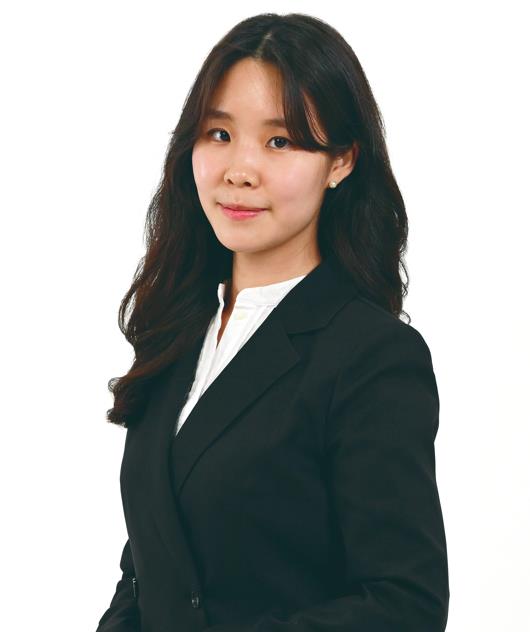[Local and Beyond] Incheon is new hometown for overseas Koreans, says mayor
S. Korea's oldest port city mulls various policies to welcome tourists, foreign residents and even bilingual city for English and Korean speakers
By Lee Jung-younPublished : May 22, 2023 - 15:14

INCHEON – After months of heated competition, Incheon was named the city to house South Korea's new office responsible for handling administrative affairs of overseas Koreans returning or visiting their home country in May. The Overseas Korean Office, which starts its physical operations in the city in June, holds significance more than just being a single state bureau, according to Mayor Yoo Jeong-bok. The establishment of this office will lay the grounds for the city's transition from the country's oldest port city to a global hub comparable to Singapore and Hong Kong, he said.
Taking a cue from the significant contributions of overseas ethnic Chinese in developing Asian cities into financial and trade powerhouses, Incheon aims to leverage the skills and influence of overseas Koreans -- especially the younger generation who were not born in Korea -- to unlock the city's potential and drive its growth.
“The second and third generations of overseas Koreans do not have a physical hometown because they were not born in Korea. With the Overseas Korean Office, however, Incheon gains the basis to become their hometown,” he said during his interview with The Korea Herald on May 12, four days after the city won the bid.
The bureau aims to create a robust framework that facilitates the integration of 7.5 million overseas Koreans, leveraging their collective expertise and experiences into a comprehensive network of business connections. This initiative seeks to tap into the vast potential of the global Korean community and foster collaborations that contribute to the growth and development of Incheon as a global hub.
Yoo has been an ardent supporter of Incheon's bid to host the bureau right after he was re-elected last year. He even flew to Hawaii, home to one of the earliest waves of Korean immigrants to the United States, to plead for support from overseas Koreans there to host the new bureau in Incheon. Yoo pointed out that Incheon's historical significance as a gateway for international interactions positions it as an ideal destination for overseas Koreans seeking to connect with their roots. With its rich heritage of cultural exchange and historical milestones in welcoming foreign immigrants, Incheon is poised to become a symbolic and welcoming home for the global Korean community, he said. Incheon was the first Korean city to open its doors to Western countries in 1883, and also the first city where foreign immigrants officially started settling in 1902.
In the modern era, Incheon's role as South Korea's main gate has persisted, as it is home to the Incheon Airport and three international cities – Songdo, Cheongna and Yeongjong.
The mayor is also planning to draw “hansang,” business people from all over the world of Korean descent, to Incheon. He also aims to build strong relationships with the World Federation of Overseas Korean Traders Associations and the Korean American Chamber of Commerce, encouraging such associations to hold events in Incheon, making the city a global business network hub.
“Incheon is a suitable location for the annual meetings of overseas Korean associations such as the World Korean Business Convention, which is held in different countries every year for now,” said the mayor, adding that the city is equipped with the capability to host several international events.
Incheon recently hosted the 56th Asian Development Bank Annual Meeting from May 2 to 5, and is now bidding to host the APEC Economic Leaders’ Meeting. If it wins the bid, it is expected to have a positive economic effect of almost 2.4 trillion won ($1.78 billion).
Yoo said he wants to make Incheon a "microcosm of the world," saying that the city already has a Korean American Town, a European Town and an Asian Town which is under construction. Overseas Koreans from each region receive opportunities to enter the Korean American Town first.
In addition to business and residential areas, cultural and leisure facilities are prepared as well. Hansang Dream Island -- a tourism complex for both domestic and overseas visitors consisting of leisure facilities, golf courses, resorts, hotels and shopping malls -- is under construction on a site of more than 3.3 square kilometers on Yeongjong Island.
“Incheon will not only be a city that provides business convenience, but one that creates more meaningful experiences,” said the mayor. “There are 168 islands, various marine tourism resources and historical traces of a port city, as well as world-class Meetings, Incentives, Conferences & Exhibitions facilities and transportation infrastructure.”
To promote the Incheon's leisure facilities, the city is planning a roadshow to showcase the its tourist attractions, specifically to visitors from Southeast Asia and China. The roadshow will take place in the second half of 2023.
Besides its tourism potential, as a region with the third-biggest foreign population in the country, Incheon is also deliberating on various policies for effective coexistence with foreigners who have settled in the city.
Statistically, there are about 80,000 foreigners living in Incheon. Songdo, a representative international city in Incheon, has 15 international organizations and five foreign universities. The city also has neighborhoods for various multicultural families, including those from China, Vietnam and ethnic Koreans who settled in Soviet territories known as “Koryoin.”
“In addition to policies to help multicultural families adapt quickly, policies to support their teenage children’s education and career exploration are being carried out. In addition, we are also carrying out education programs for Koreans to heighten cultural awareness and allow for an inclusive society without discrimination,” said Yoo.
The city is also considering passing an ordinance that would designate Songdo as a bilingual city, where all services and communications are provided in both Korean and English.
Though the ordinance is currently under review and is not likely to be passed in the immediate future, it will be possible someday, the mayor said.
Despite frosty South Korea-China relations, Incheon enjoys stable intercity connections with Chinese municipalities.
Yoo said he has been trying to establish good relations with various countries at the municipal level, as intercity connections are less affected by diplomatic tensions at the national level.
“When Korea-China relations deteriorated due to issues surrounding the Terminal High Altitude Area Defense (anti-ballistic missile defense system), I pushed ahead with interacting actively with China as a mayor. Although the diplomatic climate was chilly at the national level, Incheon began the 'In-China Project,' which promoted both business and cultural interactions at a regional level. This project is still underway," he said.
“Even when relations between countries are tense, local governments should endeavor to establish cooperative relations with different countries to pursue the interests of the people. That's the strength of a regional government,” Yoo said.
Mayor Yoo Jeong-bok began his career in 1984 at the Ministry of Government Administration, the predecessor of the Interior Ministry, after passing the civil servant exam. He began his political career as the governor of Gimpo County in 1994 and served three parliamentary terms from 2004 to 2014. He was appointed as the Minister of Agriculture, Food and Rural Affairs, and the Minister of Interior and Safety in 2010 and in 2013, respectively. He was first elected mayor of his hometown of Incheon in July 2014, and re-elected in July 2022.
This is the third installment in a series of interviews with heads of municipalities in Korea, exploring the policy commitments of local governments in promoting balanced development and regional competitiveness. — Ed.


![[AtoZ into Korean mind] Humor in Korea: Navigating the line between what's funny and not](http://res.heraldm.com/phpwas/restmb_idxmake.php?idx=644&simg=/content/image/2024/04/22/20240422050642_0.jpg&u=)
![[Exclusive] Korean military set to ban iPhones over 'security' concerns](http://res.heraldm.com/phpwas/restmb_idxmake.php?idx=644&simg=/content/image/2024/04/23/20240423050599_0.jpg&u=20240423183955)



![[Graphic News] 77% of young Koreans still financially dependent](http://res.heraldm.com/phpwas/restmb_idxmake.php?idx=644&simg=/content/image/2024/04/22/20240422050762_0.gif&u=)
![[Herald Interview] Why Toss invited hackers to penetrate its system](http://res.heraldm.com/phpwas/restmb_idxmake.php?idx=644&simg=/content/image/2024/04/22/20240422050569_0.jpg&u=20240422150649)






![[Exclusive] Korean military to ban iPhones over security issues](http://res.heraldm.com/phpwas/restmb_idxmake.php?idx=652&simg=/content/image/2024/04/23/20240423050599_0.jpg&u=20240423183955)



![[Today’s K-pop] Ateez confirms US tour details](http://res.heraldm.com/phpwas/restmb_idxmake.php?idx=642&simg=/content/image/2024/04/23/20240423050700_0.jpg&u=)